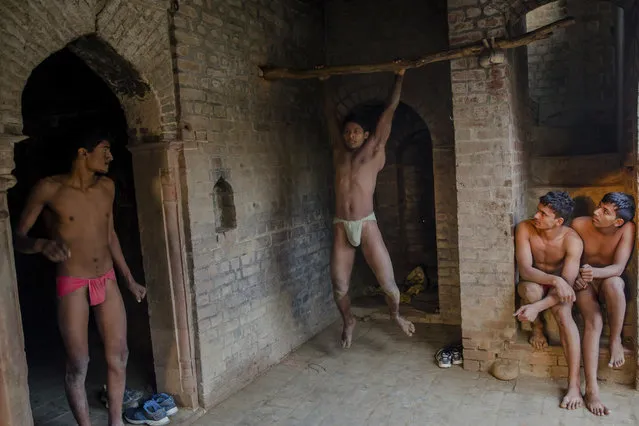
Wearing nothing but loincloths, a group of boys warm up by climbing sturdy ropes that take them high into the trees. One teenager walks around the wrestling pit swirling incense, blessing the arena and preparing it for battle. On this November evening, as the dusk thickens and the bugs venture out, a couple of dozen young devotees of kushti, the ancient Indian style of wrestling, have gathered to face off. They range in age from 10 to 16. The earth in the pit has been prepared as it has been for centuries, turned over and mixed with sawdust, turmeric and ghee, or clarified butter. It's mildly fragrant and soft to the touch, making it easier on the wrestlers' skin. These devotees, or pehelwans, have made a commitment that extends beyond the hours they spend practicing each morning and evening. They live an ascetic lifestyle, eating specific foods like almond milkshakes and chapattis slathered with ghee. They don't eat meat and refrain from smoking, drinking and dating. The sport, thought to be 2,000 years old, is mentioned in ancient Hindu texts and depicted in temple carvings. Although women wrestlers have made strides recently in India, the vast majority of participants are men. But like many traditions in a country that's rapidly modernizing, kushti wrestling faces the threat of being left behind. It remains popular in states like Haryana, where these pehelwans are training. For many poor families, wrestling provides a glimmer of hope. Those who succeed can earn money, respect in their communities and even particular jobs. They're often employed by the police force or India's railways. The boys aspire to be accepted into an akhada, a kind of wrestling hostel where they're given a bed and can devote themselves to the sport fulltime if they choose. Akhadas come with shrines to the Hindu god Hanuman, who is seen as a kind of patron saint to the sport. Here: In this November 22, 2017 photo, Indian Kushti wrestlers warm up during their daily training, at an akhada, a kind of wrestling hostel at Bahadurgarh, in Haryana, India. (Photo by Dar Yasin/AP Photo)

In this November 20, 2017 photo, photographs and certificates belonging to Indian Kushti wrestlers are displayed on the wall of Guru Hunuman Akhada, one of India's oldest akhada at Sabzi Mandi, in New Delhi, India. Like many traditions in rapidly modernizing India, kushti wrestling faces the threat of being left behind. But for many poor families, the ancient sport provides a glimmer of hope. (Photo by Dar Yasin/AP Photo)
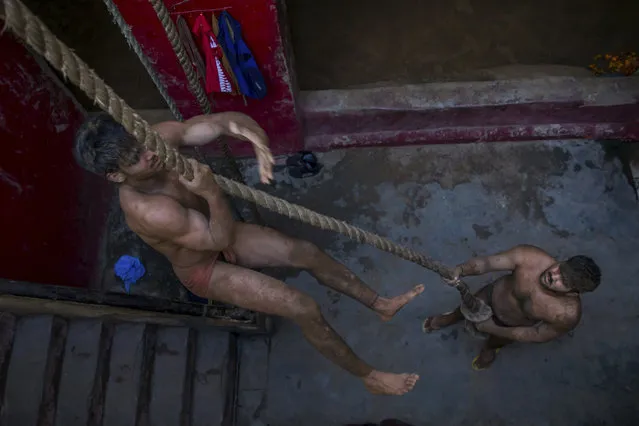
In this November 20, 2017 photo, Indian Kushti wrestlers practice rope climbing, during their daily training at an akhada, a kind of wrestling hostel at Sabzi Mandi, in New Delhi, India. (Photo by Dar Yasin/AP Photo)
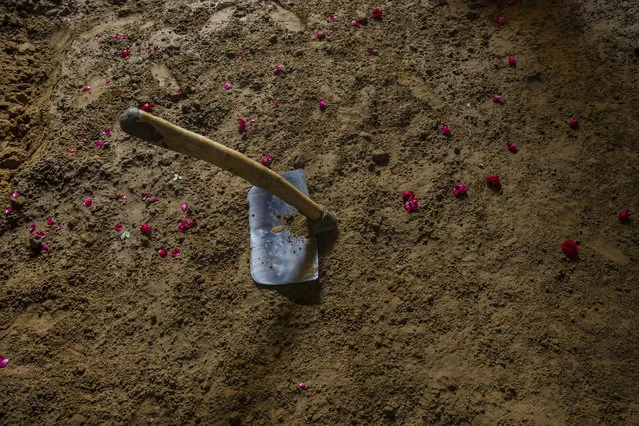
In this November 20, 2017 photo, a spade and flowers from the weekly prayers are seen inside the ring at an akhada, a kind of wrestling hostel at Sabzi Mandi, in New Delhi, India. (Photo by Dar Yasin/AP Photo)

In this November 20, 2017 photo, an Indian Kushti wrestler warms up by pulling a rope that’s threaded through a pulley and hauls into the air a bucket filled with concrete during his daily training at an akhada, a kind of wrestling hostel at Sabzi Mandi, in New Delhi, India. (Photo by Dar Yasin/AP Photo)
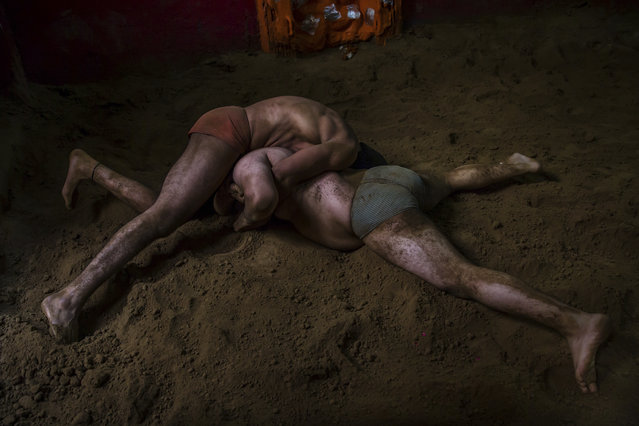
In this November 20, 2017 photo, Indian kushti wrestlers fight in the ring, during their daily training at an akhada, a kind of wrestling hostel at Sabzi Mandi, in New Delhi, India. (Photo by Dar Yasin/AP Photo)
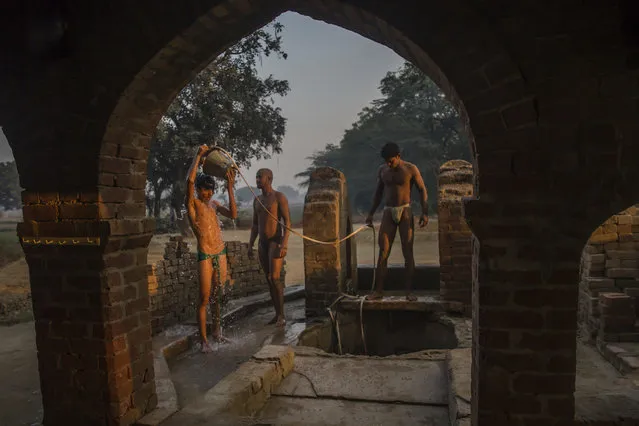
In this November 22, 2017 photo, an Indian Kushti wrestler bathes near a well as others wait their turn after their daily training at an akhada, a kind of wrestling hostel at Bahadurgarh, in Haryana, India. (Photo by Dar Yasin/AP Photo)
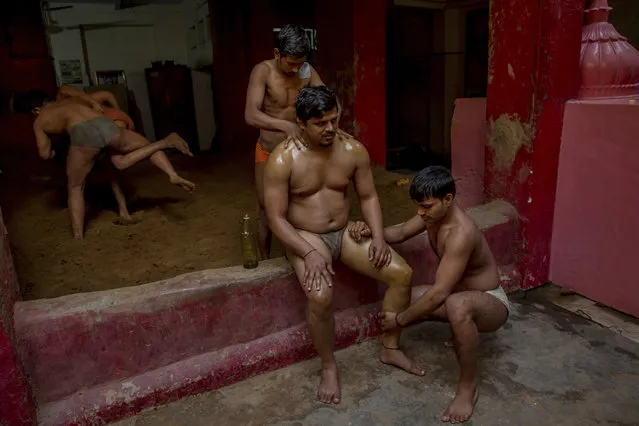
In this November 20, 2017 photo, Indian Kushti wrestlers apply oil as they give massage to a fellow wrestler, during their daily training at an akhada, a kind of wrestling hostel at Sabzi Mandi, in New Delhi, India. (Photo by Dar Yasin/AP Photo)
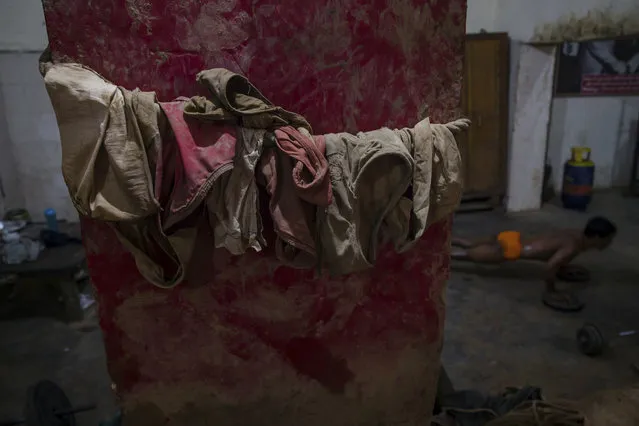
In this November 20, 2017 photo, langots or traditional undergarments worn by Indian kushti wrestlers are seen hanging on a rope at an akhada, a kind of wrestling hostel at Sabzi Mandi, in New Delhi, India. (Photo by Dar Yasin/AP Photo)
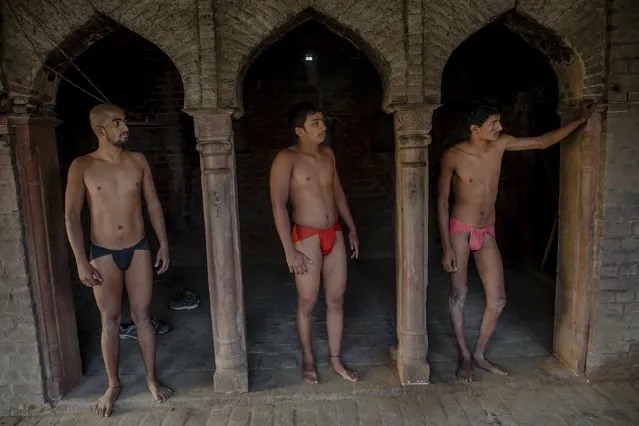
In this November 22, 2017 photo, Indian Kushti wrestlers wait for their turn to practice push ups, during their daily training, at an akhada, a kind of wrestling hostel at Bahadurgarh, in Haryana, India. (Photo by Dar Yasin/AP Photo)
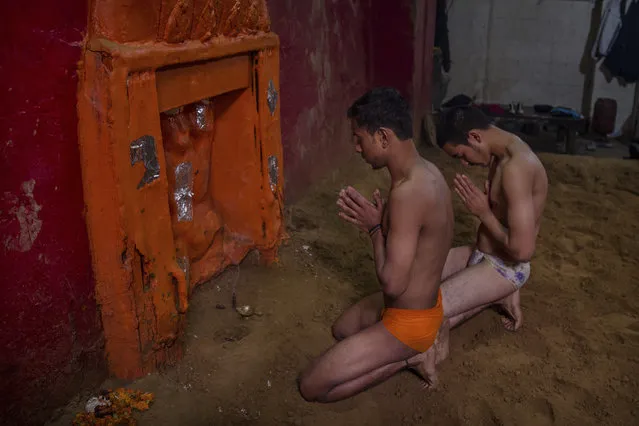
In this November 27, 2017 photo, Indian Kushti wrestlers pray near a temple of Hindu god Hanuman, inside the ring, before starting their daily training at an akhada, a kind of wrestling hostel at Sabzi Mandi, in New Delhi, India. (Photo by Dar Yasin/AP Photo)
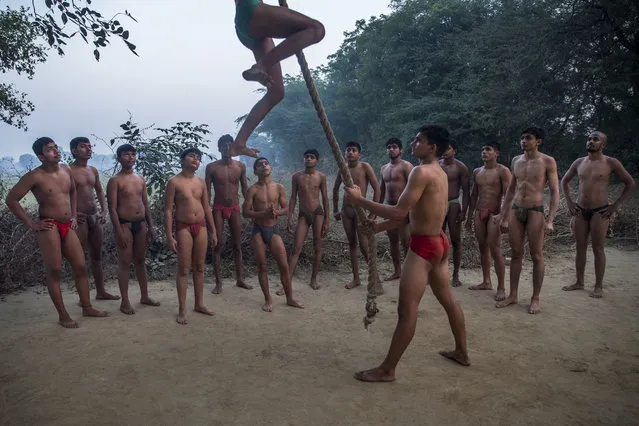
In this November 22, 2017 photo, Indian Kushti wrestlers wait for their turn to practice rope climbing, during their daily training, at an akhada, a kind of wrestling hostel at Bahadurgarh, in Haryana, India. (Photo by Dar Yasin/AP Photo)
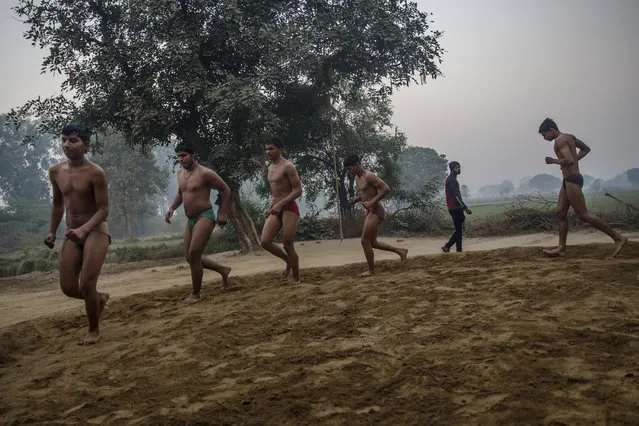
In this November 22, 2017 photo, Indian Kushti wrestlers practice during a training session, at an akhada, a kind of wrestling hostel at Bahadurgarh, in Haryana, India. (Photo by Dar Yasin/AP Photo)
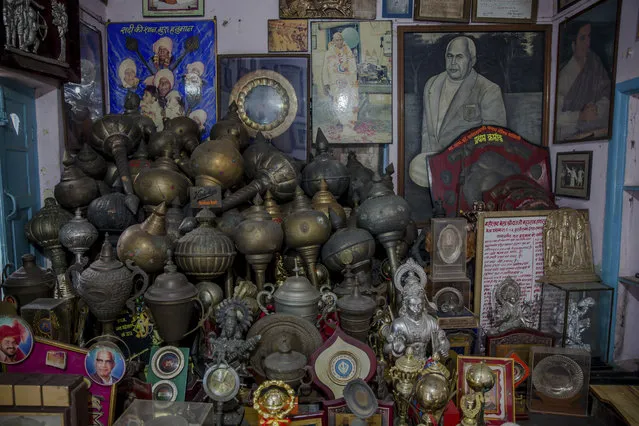
In this November 20, 2017 photo, photographs and trophies belonging to Indian Kushti wrestlers are seen inside the office of Guru Hunuman Akhada, one of India's oldest akhadas at Sabzi Mandi, in New Delhi, India. (Photo by Dar Yasin/AP Photo)
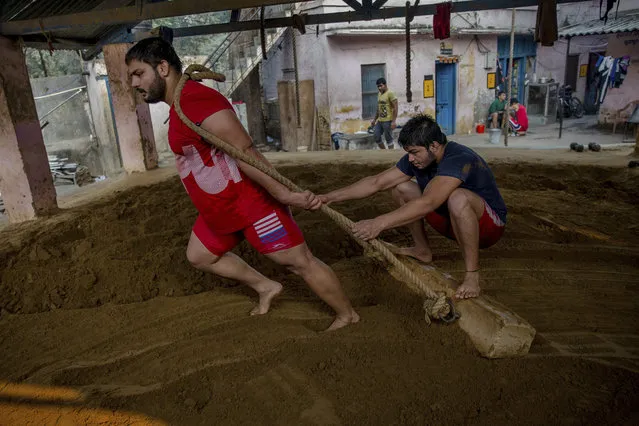
In this November 20, 2017 photo, Indian kushti wrestlers prepare the ground in the ring for a training session, at Hanuman Akhada, one of India's oldest akhada at Sabzi Mandi, in New Delhi, India. (Photo by Dar Yasin/AP Photo)
13 Dec 2017 07:35:00,
post received
0 comments
